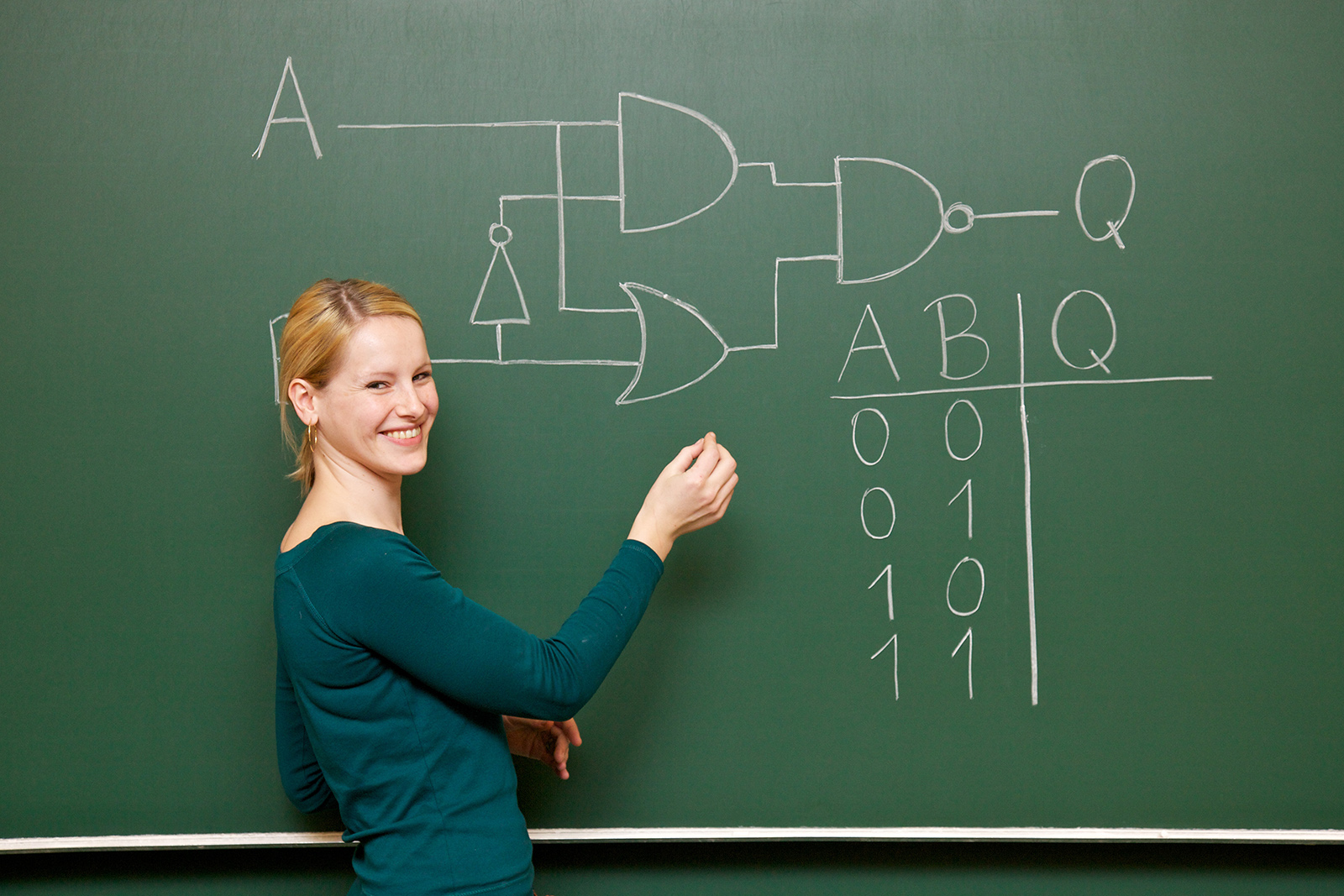The University of Klagenfurt offers excellent education opportunities in the areas of information and communication engineering and robotics and AI at the bachelor, master and doctoral levels. Our institute offers lectures, courses, labs, and seminars on all three levels.
Overview
Our two three-year bachelor programs in Informationstechnik and Robotics and Artificial Intelligence offer a high-quality university education to train basic skills in mathematics, physics, electrical engineering, and software development. The German-taught program Informationstechnik provides you with a broad education and emphasizes on electronics and circuits, signals and systems, measurement and control engineering, computer and network technology. The English-taught program Robotics and Artificial Intelligence emphasizes on robotics, AI, machine learning, along with circuits, sensors, control, and communications technology.

Our two-year master’s program in Information and Communications Engineering (ICE) enables you to specialize in a field of your choice. The following three study branches (majors) are offered:
- Networks and communications
- Autonomous systems and robotics
- Business engineering (“Wirtschaftsingenieurwesen”)
Lectures in these domains emphasize the fundamental concepts, techniques, and methods. Accompanying laboratory courses, group work, and seminar discussions provide space for training and deepening the learned material. The technical content can be supplemented by non-technical subjects to broaden your knowledge and to strengthen soft skills. The master program is held in English. The obtained degree is Dipl.-Ing.. A double degree with the University of Udine (Italy) is offered.
As an ICE master graduate, you will be well-equipped to identify and understand novel problems in your field of expertise; improve concepts, techniques, and methods; recognize and participate in technological paradigm shifts; lead development teams and manage complex projects.
The doctoral program is individually tailored to the respective research topic, where supervisors act as guides toward the PhD. Each professor typically supervises five to ten doctoral students. Most of them are employed in research projects or funded by international programs. Students are expected to publish research results in international journals (mainly IEEE and ACM) and present at peer-reviewed conferences.
Bachelor Courses
Compulsory Lectures
Electricity and Magnetism (Christian Bettstetter): Electrostatics; electric current; magnetism; electromagnetic induction; electromagnetic waves.
Design of Digital Circuits (Bernhard Rinner): Combinatory logic; design of combinatory circuits; basic combinatory functions and circuits; arithmetic functions and circuits; sequential circuits; registers and register transfer; memory elements; micro processors.
Circuits (Wilfried Elmenreich): AC circuits; quadripoles; basic transistor circuits; operational amplifier; analog filters; analog-digital and digital-analog conversion.
Communications (Andrea Tonello): Signals and systems; Fourier series and Fourier transform; elements of random variables and processes; transmission of information; base band and pass band modulation techniques.
Digital Signal Processing (Stephan Alexander Weiss): Digital signals and systems; Fourier and Laplace transform for discrete time signals; digital filters and design methods; principles of multirate signal processing.
Each compulsory lecture is accompanied by an exercise course or lab course.
Introductory Labs
Our institute offer the following laboratory units for bachelor students as part of the Grundlagenlabor that students take: Pervasive Computing, Wireless Sensor Networks, Basics of Communication Protocol Design and Smart Microgrids.
Optional Lectures
Programming in C (Udo Schilcher): Syntax; pointers and addresses; data structures; memory management; bit operations; file access; logic and microprocessors (Arduino as an example).
Master Courses
Compulsory Lectures
Mobile Communications (Christian Bettstetter): Antennas; radio propagation; diversity; channel coding; modulation; multiple access; cellular concept; medium access control; WLAN.
Signal Processing for Communications (Andrea Tonello): Signal theory; random processes; complex signals representation; analog modulation; optimum quantization; digital modulation and optimum detection; optimal sequence estimation and linear equalization algorithms.
Sensor Networks (Bernhard Rinner): Hardware and software aspects; medium access control protocols; routing; synchronization; security and privacy; applications and case studies.
Each compulsory lecture is accompanied by an exercise or lab course.
Advanced Lectures
Pervasive Computing (Bernhard Rinner): Wireless personal networking; localization; identification; context-awareness; sensor networks; wearable computing; cooperation; middleware systems; nontechnical aspects.
Wireless Networks (Christian Bettstetter): Network architecture; mobility protocols; LTE networks; security; ad hoc networks: routing, relaying, connectivity, capacity; economic, health, and social aspects.
Smart Grids (Wilfried Elmenreich): Energy generation; energy distribution networks; photovoltaics and wind power; energy sustainability; smart microgrids; smart metering and home automation; e-mobility.
Information Theory (Johannes Huber): Basic definitions; source coding theorem; lossless compressing codes; channel coding; information theory for continuous random variables; tradeoff between power and bandwidth efficiency; rate distortion theory.
Advanced Wireless Communications (Andrea Tonello): Mobile wireless channel; baseband representation of a digital modulation system; performance analysis of digital modulation in fading channels; antenna diversity techniques and performance; multicarrier modulation; spread spectrum systems; ultra wide band modulation; wireless standards.
Simulation of Networked Systems (Pasquale Grippa): Data analysis; random numbers and random variables; agent-based simulation; Netlogo; simulation-based design of self-organizing systems; RAPSim microgrid simulation; simulation in computer games; wireless network simulation.

Multimedia Systems (Hadi Amirpourazarian, Farzad Tashtarian): Quality of service and resource Management; multimedia networking; multimedia servers; social media.
Power Line Communications (Andrea Tonello): Channel characterization; channel modeling; transmission line theory; background and impulsive noise models; multiple input multiple output; physical layer techniques; medium access control; resource allocation algorithms; relaying and cooperative schemes; standards and protocols.
Supplementary Lectures
Sustainability in Computer Science (Wilfried Elmenreich): Lecture series covering various aspects of sustainability in computer science and computer engineering, featuring contributions from multiple experts.
Digital Signal Processors (Bernhard Rinner): Introduction to microprocessors; fundamentals of DSPs; development of DSP systems; examples of DSPs; DSP programming; DSP applications and case studies.
Artificial Vision (Gian Luca Foresti, Christian Micheloni, Claudio Piciarelli): Logical architecture; change detection; active vision; object recognition; space projection; network reconfiguration; event analysis; re-identification.
Smart Cities (Wilfried Elmenreich with colleagues from other institutes): Energy modeling and technology; big data; traffic systems; management and governance.
Additional lectures, exercise courses, and labs are offered as free electives.
